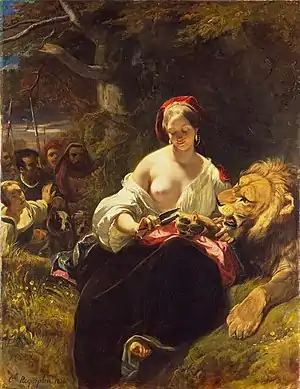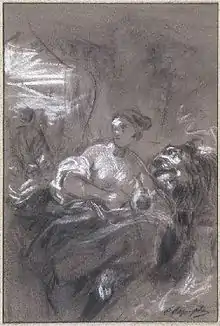
The Lion in Love is an 1836 oil on canvas painting in the Academic-Romantic style by Camille Roqueplan (1800–1855) now in the Wallace Collection in London.[1]

It shows a scene of a lion allowing its claws to be pared after falling in love with a shepherdess so that he will not endanger her, told in Jean de La Fontaine's fable Le Lion amoureux ,[2] though the painter adds an erotic undercurrent reminiscent of Delilah cutting Samson's hair as well as a Romantic spin on Beauty and the Beast by making the woman the one to pare the claws, thus portraying female beauty as life-threatening, maddening and ultimately fatal.[3] It also forms part of a contemporary fashion for the femme fatale in literature, art and opera.[4]
It was first exhibited at the 1836 Paris Salon under the title Le Lion amoureux,[5] before being acquired by Louis-Philippe of France's son and heir Ferdinand Philippe.[6] His widow Helene then sold it on 18 January 1853 in Paris to Richard Seymour-Conway, 4th Marquess of Hertford, whose illegitimate son Sir Richard Wallace inherited it with the rest of the Marquess' art collection.[7]
Bibliography
- (in French) Theophile Gautier: Camille Roqueplan. In: Histoire du romantisme. G. Charpentier et Cie, libraires-editeures, 1874; S. 191–199; S. 195 (Online frz.)
- (in French) Jean de La Fontaine: Le Lion amoureux. In: Les Fables; livre IV, 1. 1668/1694 (Online bei Encyclopédie de L'Agora; frz.)
References
- ↑ "ArtUK entry".
- ↑ (in French) Le Lion amoureux. In: Les Fables; livre IV, 1. 1668/1694
- ↑ The Lion in Love (catalogue entry))
- ↑ Heather Braun: The Rise and Fall of the Femme Fatale in British Literature, 1790-1910. Fairleigh Dickinson University Press, United Kingdom 2012; S. 3 (Auszüge online)
- ↑ (in French) Theophile Gautier: Camille Roqueplan (1874), S. 195
- ↑ The Lion in Love (Homepage der Wallace Collection: History)
- ↑ The Art-Journal. Vol.5, 1853, S. 81: Sale of the Pictures of H.R.H. The Duchess of Orleans